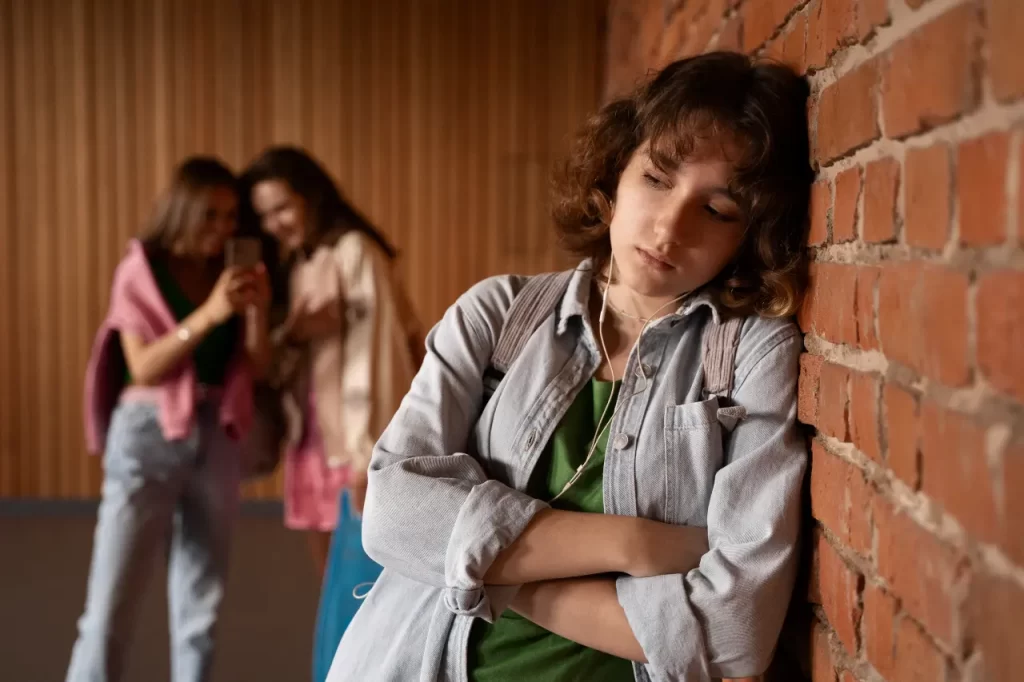
Written by
Anju S. John M.Sc. Psychology
Psychologist

Clinically Reviewed by
Minna Mathew
Clinical Psychologist
Adolescence is mainly a transition stage from childhood to adulthood, and for teens, this period often marks a phase of experimentation. They may be interested in trying out new things, which may include different drugs, smoking or alcohol to fit into the peer group and to avoid the fear of being left out in the peer group if they don’t comply with the pressure. But many times, this abuse of drugs which was started out of curiosity, may go out of hand, and there can be a rapid shift from drug abuse to drug addiction if the problem is not properly addressed.
The use of drug abuse is expanding at an exponential rate, especially among the teenage population today. The sudden pandemic outbreak, along with the extended lockdowns, has made the condition even worse. Now, how do we understand that drug abuse has turned into an addiction, and as a parent of a teenager, what are the things you should be aware of? Let’s delve more into the topic.

Definition of drug addiction
Addiction is typically a neuropsychological condition defined by a persistent and strong drive to engage in maladaptive behavior’s that offer immediate sensory rewards, regardless of their destructive consequences.
Drug addiction, which falls under the category of substance-related disorders, is a long-lasting and relapsing brain condition that includes drug use and abuse despite the harmful consequences. Repeated drug use can change one’s brain and lead to addiction. As the changes in the brain due to addiction can be lasting, drug addiction is considered a “relapsing” disease. This may indicate that even after years of not taking drugs, people in recovery are at risk of taking drugs again…
Unfortunately, many teenagers are falling prey to this loop of addiction. Heroin, Opium, Alcohol, Cannabis and Propoxyphene are the five most common drugs being abused by children in India.
Importance of recognizing warning signs
Despite the best efforts and intentions of parents, some adolescents may still become victims of drug addiction and abuse within their community. In such cases, it is crucial for parents and guardians not to hesitate to get their child into a treatment center. It is also important for parents to recognize the indications of drug or alcohol abuse in teenagers. Many parents may mistakenly assume that a teenager’s change in behavior is due to “teenage angst” and may ignore the warning signs. When parents overlook the warning signs, the teenager may end up developing a full-blown addiction, known as a substance use disorder. Early intervention is necessary for teenagers who exhibit signs of substance abuse. The longer the period a person abuses drugs or alcohol, the more challenging the detox and withdrawal process will be for them.
So what are some warning signs to look for in order to tackle the issue? Let’s explore!
Warnings
When it comes to recognizing drug abuse, every substance will have a different set of symptoms, but there are common symptoms that are present no matter what substance is being abused.
Physical Warning Sign
Changes in appearance
- A drastic change in appearance
- Bruises or marks on arms or legs
- Different tastes in their clothing choices or using dresses to cover up marks.
- Experiencing abrupt weight gain or loss
- Pinprick or large pupils
- Eye reddening or bloodshot eyes
- Nasal irritation or nosebleeds
- Puffy eyes, swollen face
- Poor hygiene
- Avoids eye contact
- Starts using mints or chewing gum to cover up their breath
Health problems
- Increased sleepiness and fatigue, dozing off at inappropriate time.
- Unusually lethargic throughout the day
- Has become unusually clumsy: appears to have poor balance or lacking coordination
- Experiences periods of high energy or sleeplessness, followed by extended periods of “catch up” sleep.
- Shaky hands or cold, sweaty palms
- Blisters or spots on the mouth
- Frequent perspiration
- Headaches and vomiting
- Rapid-fire speech or slurred speech
Behavioral Warning Sign
Changes in attitude and personality
- A sudden change in personality
- Sudden lack of interest in activities they usually enjoy
- Irresponsible behaviour
- Poor judgment and illogical speech
- General lack of interest
- Goes out often, frequently breaking curfew
- Making excuses to justify lying
Changes in school performance
- Withdrawing from classroom participation/slipping in grades
- Being unable to perform at school
- Missing important appointments
- Resisting discipline or feedback
- Missing school or work
- Becoming withdrawn or secretive
Changes in social behavior’s
- Damaging relationships with family or friends or isolation from others
- Breaking rules
- Engaging in socially inappropriate behavior’s like stealing, fights or violence
- Resisting discipline or feedback
- Gives up or misses out on activities that were earlier important to them or gave them pleasure in order to use drugs.
Psychological Warning Signs
Mood swings and irritability
- Moodiness or sudden mood swings
- Difficulty to stay focused on a task
- Increased hostility or aggression towards self as well as others
- Extremely hyperactive or extremely tired
- Low motivation
- Low control over inhibitions
- Impulsive
- Engaging in risk-taking behavior’s

Depression and anxiety
- Withdrawn or depressed
- Anxious
- Fidgety
- Crying
- Low energy
Environmental Warning Signs
- Strange smells either on their clothing or in their bedroom
- Presence of medicine bottles or packets, despite a lack of any illness or drug equipment in your teen’s room
- Locking bedroom doors
- Making secretive calls
- Disappears for long periods
Changes in peer group
- A complete change in peer group
- Abandoning long-time friends
Changes in family relationships
- Frequent requests for money
- Withdrawing from the family
- Low attachment with the close ones
What to Do If You Suspect Drug Addiction in a Teen
How to approach the issue
If a drug or alcohol addict loses access to the substance, they may panic, lash out, and become unreasonable. Withdrawal symptoms will occur when a person loses access to an addictive substance.
It is important that parents seek the help of a qualified drug addiction counselor who is experienced in treating teens before dealing with their teenage child directly about suspected drug use or alcohol addiction. Having a conversation with your teenager can be a difficult experience for parents, so a counsellor or psychologist can help you prepare emotionally. Families can ask questions about rehabilitation treatment for adolescents and get answers from the counsellor to any concerns they may have. This type of conversation with a teenager may not be as smooth as the parents hope, but a psychologist or a counsellor can help parents choose the best way to initiate the conversation and open up by employing de-escalation techniques to keep the conversation positive and move in the right direction.
Treatment options
Addiction and drug abuse affect millions of people every year. Despite the fact that substance abuse disorder is quite common, it affects teenagers in different ways, and treatment methods must be customized to the individual:
Detox
Detox (or detoxification) is where the drugs or alcohol are flushed out so that the real healing can begin. During this stage, your teen may experience withdrawal symptoms as well due to physical or mental anguish from not feeding their addiction. With the help of drug and alcohol detox, doctors can assist them through any withdrawal pains with the help of medications.
Cognitive-Behavioral Therapy
CBT encourages patients to question and analyze recurring thoughts in order to eliminate those that are negative and unhealthy. CBT can help people with coping skills by identifying situations that are risky and what to do about them and preventing relapse.
Individual, Group & Family Therapy:
Patients may participate in therapy guided by a therapist in individual sessions and with a group in a safe, peer-supported environment, and/or with participation from family or anyone significant in the patient’s life. Group and family therapy help with their loneliness, makes them feel they are not alone in their struggles and provides a supportive and accepting environment.
Conclusion
Summary of warning signs
A person’s detox and withdrawal process will be more difficult if their drug or alcohol abuse period is longer. When you understand the signs and symptoms of teenage drug use, it becomes easier to decide if or when a teen drug intervention program may be appropriate.
Importance of early intervention
It is important to seek treatment for drug abuse in teens at the first signs of the issue since its consequences are significant. While trying new things may be common among teens, drugs can quickly spiral out of control if left unaddressed.
When you begin to notice substance abuse, do not hesitate to seek the help of a qualified psychiatrist or psychologist. It is important to intervene and deal with the underlying issues that have led your teenager to experiment with drugs. However, protective factors such as strong parental relationship, self-control, academic competence and good neighborhood attachment can reduce the risks and keep your teens safe from drugs and alcohol.

